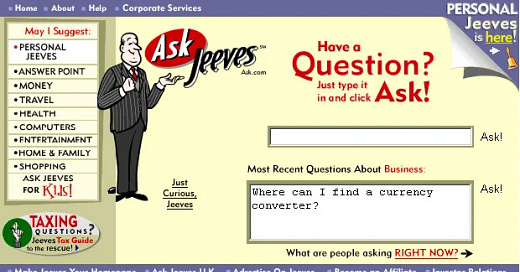Perplexity Will Go The Way Of Ask Jeeves.
The 90s were a wild time.
Thirty-year-old actors played high school kids on TV. Boy bands reigned supreme on the Billboard charts. And every summer blockbuster wasn’t a comic book sequel.
But just like kids wearing high-waisted mom jeans, a concept from the 90s has reentered pop culture and will likely prove that although history doesn’t always repeat, it often rhymes.
For the old heads out there who witnessed the birth of the Internet age, you likely remember what Ask Jeeves was. If you’re younger, Ask Jeeves was one of the first natural language search engines. In 1996, asking a search engine a question like “How do I cook eggs” was a completely revolutionary idea.
Ask Jeeves wasn’t a chatbot like modern AI platforms. Instead, it categorized knowledge into capsules and would answer many common questions directly on the page with canned responses. It was a bit of technological sleight-of-hand, but it dazzled users at the time.
For things Jeeves didn’t have a canned answer for, it would default to the traditional search results people expected from Yahoo or Excite, which were the big search engines at the time (Yes, Yahoo once ruled the internet).
This was two years before Google was publicly available to the masses, and we all know the history of how the search engine wars played out. Google is still number one and Ask Jeeves is a fun although mostly forgotten footnote despite being revolutionary at the time.
So what does this have to do with Perplexity? Well, its future is likely to be very similar to what happened to our old tuxedo-wearing friend Jeeves.
Jeeves was ultimately displaced by Google, but in those days Google only owned about 30% of the search market. Today, Google owns over 90% of the search market. Not to mention how it’s bundled into Android phones and other devices.
That’s where Perplexity will have a problem. Despite its product being as revolutionary as Ask Jeeves was, and in many ways much more so, it’s too easy to be cloned and placed within the Google behemoth ecosystem.
It’s the same way Instagram halted Snapchat’s forward movement by simply adding its own short video feature. What Snapchat offered wasn’t unique enough to fend off larger competitors who only needed a few months to steal Snapchat’s USP.
Google already does most of what Perplexity offers and it will have 100% of those features in less than a year. Any improvement Perplexity makes, Google will simply clone it within a month the same way Instagram did with short videos.
This isn’t to knock Perplexity or it’s innovation, but in tech, you have to offer a product so unique that the behemoths can’t simply copy it and then leverage their overwhelming network effect to push you out.
Even if Perplexity was 100,000,000,000,000,000X better than Google, global users switching to Perplexity would still take nearly a decade. Habits die slowly and Google is simply a habit at this point. The results work for 90% of users and only power users prefer tools like Perplexity.
Heck, Yahoo is still around and still adding verticals in 2024. Using Facebook is a giant meme at this point, but it still has so many users that generate income for Mark Zuckerberg he can blow $50 billion on virtual reality tools that nobody wants, and the Meta stock still outperforms.
Old habits die hard, even in the tech world.
People who are deep into tech forget that the world isn’t full of power users. It’s mostly people who couldn’t care less about the underlying technology and just want to know where to order sushi at 2 a.m. on a Wednesday when they tap their phone screens.
If Google does that, they’re happy.
Perplexity is a great tool and I’m not knocking it. But it has no future because it’s simply not unique enough to fend off Google and steal market share.
The math just doesn’t work out.
That’s not to say Perplexity won’t make a lot of people a lot of money. The same way Ask Jeeves turned plenty of people into millionaires, both before and after the IPO. Perplexity will also license its technology for years, just like Ask Jeeves did. This will bring in millions more.
But it won’t be the next search giant, it’s just not different enough to keep Google from catching up before users are tempted to switch.
Google has such an overwhelming network effect and built-in habitual user base that only a technology that Google is unable to clone will be enough to dethrone them in search.
That day will come, but it’s not today.
—
James La Forte is an IT professional & freelance writer focusing on technology, business & finance. His work has been featured in U.S. News & World Report, TechRepublic, MarketWatch, Gartner Insights, and other publications.




